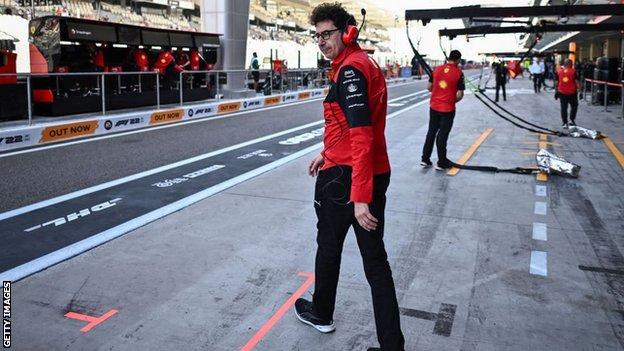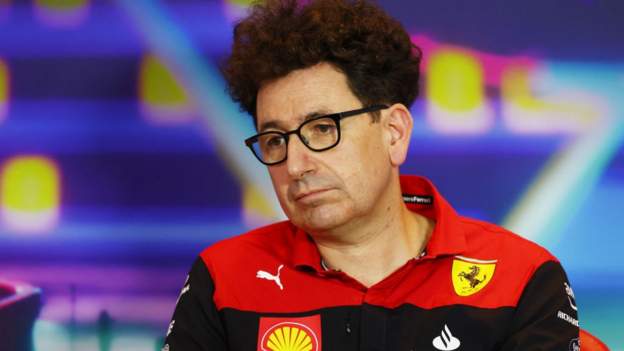
Mattia Binotto is to leave his position as Ferrari team principal at the end of the year.
A statement from Ferrari on Tuesday said the 53-year-old had resigned from his role and that the process to identify a replacement was “underway”.
Binotto, who has been with Ferrari since 1995, said: “With the regret that this entails, I have decided to conclude my collaboration with Ferrari.
“It is right to take this step, as hard as this decision has been for me.”
Binotto worked his way up through the company to first head the engine department, then be technical director of the entire F1 team and finally to lead it.
He leaves at the end of a season in which Ferrari achieved their goals of returning to winning races, but which was marked by a series of reliability failures and operational errors.
Binotto said: “I am leaving a company that I love, which I have been part of for 28 years, with the serenity that comes from the conviction that I have made every effort to achieve the objectives set.
“I leave a united and growing team. A strong team, ready, I’m sure, to achieve the highest goals, to which I wish all the best for the future.”
Ferrari chief executive officer Benedetto Vigna thanked Binotto and wished him well, adding that his work meant the team were “in a strong position to renew our challenge, above all for our amazing fans around the world, to win the ultimate prize in motorsport”.
Alfa Romeo team principal Frederic Vasseur has been tipped as Binotto’s replacement.
Why has this happened?
Ferrari’s statement announcing Binotto’s resignation comes two weeks to the day after the company described reports in Italy that he was to leave the team and be replaced by Vasseur as “totally without foundation”.
At the final grand prix of the season in Abu Dhabi, Binotto seemed to have no intention of leaving his position.
He said that he had “had a chat” with Ferrari chairman John Elkann, in which they had “discussed openly what was the best way to move forward” and “decided to release a statement that was maybe the best way to close any speculation”.
Yet it was an open secret within F1 over the Abu Dhabi weekend that Binotto was to leave, and that Vasseur was being lined up as his replacement. And now the “speculation” has, as expected, proved to be accurate.
Binotto has paid the price for not addressing Ferrari’s weaknesses this year. He achieved his target of returning the team to competitiveness, but Ferrari squandered their first winning car since 2018 with a series of operational errors and reliability failings.
Their driver Charles Leclerc left the third race of the season with a 46-point lead over eventual champion Max Verstappen. Three races later, astonishingly, the Red Bull driver was in a lead he never lost.
Leclerc’s campaign was torpedoed in three catastrophic races in late spring and early summer. He suffered engine failures while leading in Spain and Azerbaijan, and the team cost him victory from pole position in Monaco when they bungled his strategy.
Further race-management errors in Silverstone and Hungary cost Leclerc two more wins. In the second half of the season, Red Bull moved ahead in car development, and errors continued to pepper Ferrari’s operations.
Winning pace came with fallibility
Binotto tried to instil a no-blame culture at Ferrari in a bid to remove the environment of fear that many believe stifles creativity and brave decisions at the team.
But the concern within Ferrari was that, despite that, there was little apparent progress in solving the team’s inherent problems.
The point of a no-blame culture is to create an environment of responsibility and trust that enables issues to be identified, understood and solved without those involved fearing for their jobs. At Ferrari this year, though, little appeared to change despite the repeated errors.
The mistakes also seem to have frayed the patience of Leclerc, one of the major stars of the new generation of drivers. And, with Lewis Hamilton in his late 30s, the fear of losing the Monegasque to Mercedes in the future is also behind this decision.
Questionable race strategy and a failure to keep pace with the development of rivals such as Mercedes and Red Bull have been recurring themes at Ferrari for a decade and more.
If Vasseur does join as expected, he will take with him to Ferrari a reputation as an effective race-team leader. But although he has been a boss of both the Renault (now Alpine) and Alfa Romeo teams, he has never had a job as high-profile and high-stakes as this.
Vasseur has a strong relationship with Leclerc, having run him in the junior categories, but it will take more than that to turn Ferrari into a team capable of challenging for the F1 title.
